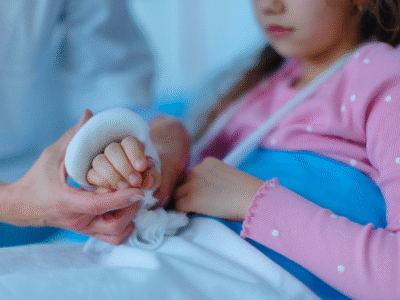Common Causes of Child Injuries: A Legal Perspective

As a society, we must prioritize the safety of our children above all else. Parents and caregivers play a crucial role in child injury prevention by supervising activities, providing safety education, and modeling safe behaviors. The community can support prevention efforts through infrastructure improvements, implementing safety programs, and fostering a culture of awareness and accountability.
Together, we create environments prioritizing child safety, reducing the risk of accidents, and promoting healthy development. It’s essential to remain vigilant, educate ourselves and others, and be aware of potential dangers and legal consequences to prevent injuries to our little ones.
Common Causes of Child Injuries
Child injuries can have serious consequences, impacting both physical health and emotional well-being. It’s crucial to address common causes of child injuries to ensure their safety and well-being:
- Car accidents: Properly securing children in car seats and ensuring seatbelt usage are crucial for preventing injuries in the event of an accident. Distracted driving poses a significant risk to child safety, as drivers may not react in time to avoid collisions.
- Playground accidents: Lack of supervision on playgrounds can lead to serious injuries. Unsafe equipment and play areas increase the likelihood of accidents. Installing age-appropriate play structures is key to minimizing risks.
- Swimming pool accidents: Inadequate fencing and barriers around swimming pools create drowning hazards for children. Lack of lifeguards or adult supervision further exacerbates the risk. Enrolling children in swimming lessons can enhance their safety around water.
- Bicycle accidents: Wearing helmets significantly reduces the risk of head injuries in bicycle accidents. Proper supervision and guidance on road safety are essential for young cyclists. Ensuring children use appropriately sized bikes also minimizes the risk of accidents.
- Daycare incidents: Lack of proper supervision, failure to address safety hazards promptly, or intentional harm by staff members are examples of negligence and abuse that can result in harm to children under daycare care.
Pursuing an Atlanta Child Injury Claim or Lawsuit
If a child is abused or harmed due to somebody’s negligence, it’s important for parents and legal guardians to consult with a child injury lawyer to determine the best course of action. Lawsuits for child injuries are complicated by the fact that a child does not have the right to file an Atlanta personal injury claim or lawsuit.
Under Georgia law, standing to file a claim on behalf of an injured child is typically held by the child’s legal guardian or parent. This individual is authorized to bring a lawsuit on behalf of the child and to act in the child’s best interests throughout the legal proceedings.
If the child’s parents are deceased or incapacitated, a guardian ad litem (an appointed representative of the child’s interests) may be designated to represent the child’s interests. Additionally, in cases involving significant injuries or complex legal matters, an attorney may be appointed to advocate for the child’s rights and pursue compensation for their injuries.
Understanding Property Owner Liability
Property owners have a legal responsibility to maintain safe conditions on their premises, especially when children are likely to be present. Georgia law recognizes the attractive nuisance doctrine. Under this legal principle, property owners may be held liable for injuries sustained by children trespassing on their property if the property contains an attractive nuisance, such as a swimming pool, trampoline, or construction site, which is likely to attract children despite being potentially dangerous.
The doctrine imposes a duty on property owners to take reasonable steps to prevent harm to children, such as installing fences or warning signs, even if the children are trespassing. Failure to fulfill this duty may result in liability for any injuries that occur as a result of the attractive nuisance.
Heightened Duties for Childcare Providers
Georgia law recognizes a heightened duty of care owed to children by certain professionals, including teachers and childcare providers. This heightened duty is often referred to as the “in loco parentis” doctrine, meaning “in the place of a parent.”
Under this doctrine, teachers and childcare providers are expected to exercise a higher standard of care and supervision over children under their charge, similar to that of a parent. This duty extends to ensuring the safety and well-being of children in their care and taking reasonable precautions to prevent foreseeable harm. Failure to meet this duty may result in liability for negligence if a child is injured as a result.
Taking Preventive Measures
Community awareness and education are vital in preventing child injuries. Collaborative efforts involving schools, local authorities, and parents can help identify and address safety concerns in neighborhoods and public spaces.
Legal action serves as a crucial tool in holding accountable those responsible for child injuries. By raising awareness, implementing preventive measures, and taking legal recourse when necessary, communities can prioritize child safety and reduce the incidence of preventable accidents.
Has Somebody Harmed Your Child?
If your child was injured due to someone else’s wrongful or careless behavior, either directly or indirectly, the Atlanta child injury attorneys at Grant Law Office are here to help. We understand the unique nature of these types of cases, and we will always serve you with the compassion and respect you and your family deserve.
Call our Atlanta office at (404) 995-3955 today for a free consultation to discuss your legal options.
Contact us today for a free and comprehensive case evaluation.
We require no legal retainer or upfront fees,
and you pay nothing unless we prevail.
Phone: (404) 995-3955




